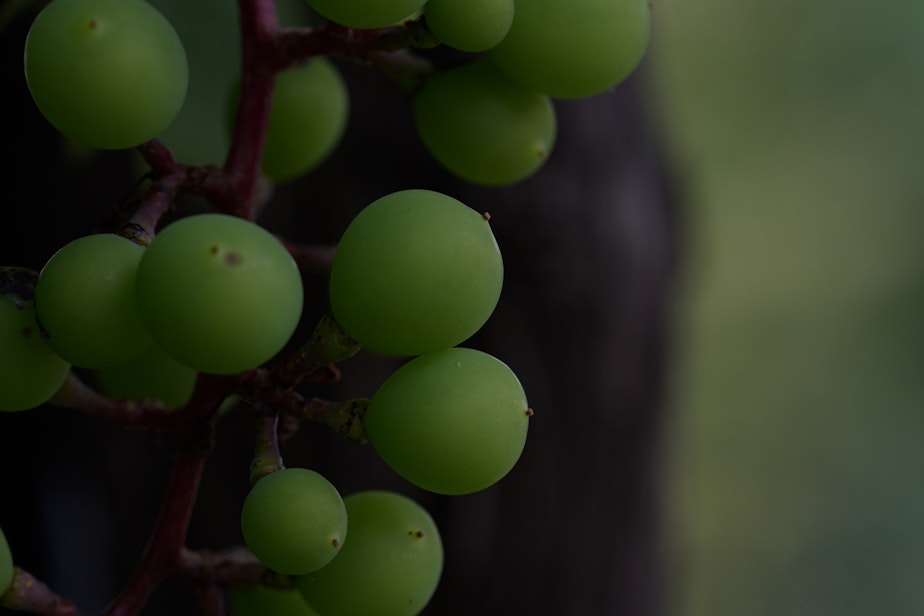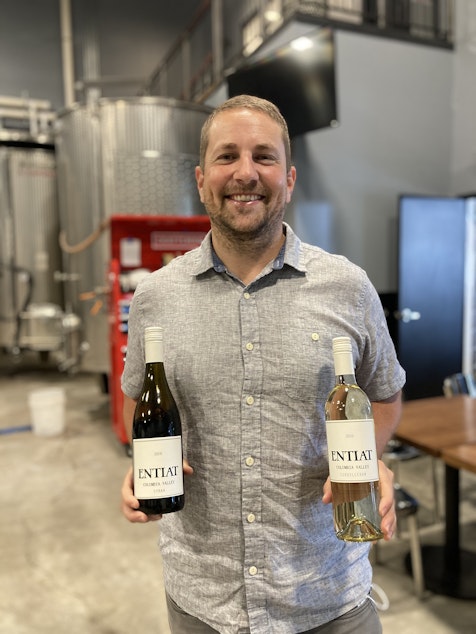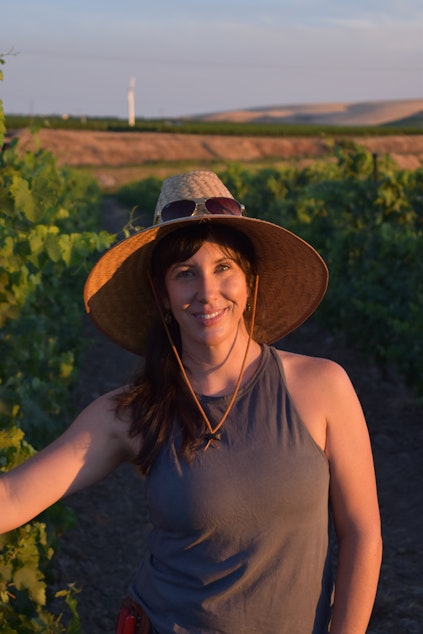Seattle Now: Wine lovers, prepare to be crushed
Wildfire smoke is choking vineyards, ruining Pacific Northwest wines and threatening the family dreams of local winemakers.
While you might be looking for a little smokiness in your Cabernet to go with your steak dinner, you're probably not in the market for wine that's actually been smoke-tainted by wildfires.
In this episode of Seattle Now, guest-host Paige Browning joins local winemakers to explore the losses and hard choices they're facing as they open up bottles made from last year's grapes and discover that their wine is ruined.
We'll also hear from Washington State University professor Tom Collins who runs a research program on grape wine aroma and flavor chemistry. Collins says wines made from grapes grown surrounded by wildfire smoke include top notes of cigar butts and ashtrays.
However, in the midst of battling this disaster, at least one winemaker is holding onto hope. Brooke Delmas Robertson, Director of Winegrowing for Delmas wines and SJR Vineyard, says that there were still a lot of excellent wines produced from 2020 grapes. She also says that that grapes are resilient, even in the face of climate change and a pandemic.
The transcript below has been edited for clarity.

DANE IUSSIG: See the difference?
PAIGE BROWNING: Yeah.
DANE IUSSIG: ...it's a little tamer ... It's kind of like when you like put out a fire like your campfire and you're just dumping water on it and like that that wet charcoal. That's what it's really what's really going on with it for me.
PAIGE BROWNING: It's so interesting because, to me, this tastes like a good wine. But now that I know that it's smoke tainted, it does taste like it's maybe been roasting on the coals for a few minutes.
That's not how a 2019 Syrah should taste. But it's a problem as the Northwest sees fires and smoke erupt each summer, causing a headache for winemakers.
And that headache has a double meaning for winemakers like Dane Iussig, creator of Entiat Wines.
DANE IUSSIG: I started my brand in 2018. And I wasn't aware that smoke was really even present in the vineyard. I kind of contracted those grapes later and I wasn't aware that there was a massive fire up the river. And all that smoke kind of came down and settled into where this vineyard is.

 1 min
Brooke Delmas Robertson, Director of Winegrowing for SJR Vineyards, on how even though 2020 often gets framed as a disaster, for winemakers, there were positives along with the losses.
Wildfires impact grape growing season, ruining many Pacific Northwest wines with smoke taint. However, Robertson says there was still a lot of fantastic wine produced from grapes that survived the fires last year.
1 min
Brooke Delmas Robertson, Director of Winegrowing for SJR Vineyards, on how even though 2020 often gets framed as a disaster, for winemakers, there were positives along with the losses.
Wildfires impact grape growing season, ruining many Pacific Northwest wines with smoke taint. However, Robertson says there was still a lot of fantastic wine produced from grapes that survived the fires last year.
PAIGE BROWNING: This is your first batch?
DANE IUSSIG: My very first batch of wine, so on my own. So it took about a year for it to really develop and just explode with all the smokiness in the wine. So I wasn't even aware that it was happening. It kind of crept up and kind of developed those characteristics of charcoal and creosote and wood smoke later on, and became just so apparent that when I opened up the bung out of the barrel, I could smell it without even sticking my nose in there. So yeah, it was very intense. And just kind of rocked my world because this is my baby, and now it's something that I didn't want it to be. Yeah, I just kind of took it as a loss. Which is tough because I've already invested so much money into starting this brand and everything, and then to have my very first wine, just the super smoky, is just as tough to comprehend.
What exactly is "smoke taint"
Tom Collins is a professor at Washington State University. He runs a research program on grape wine and distilled spirits aroma and flavor chemistry. One of his big research areas right now is looking at the impact of smoke exposures in vineyards on grape and wine quality.
TOM COLLINS: So "smoke taint" or what is sometimes known as smoke-affected wines, refers to the aromas and flavors that are associated with wines that are made from grapes that have been affected by smoke from wildfires.
The fruit can take up some of these compounds from the smoke, and then when we make wine from that fruit, these compounds that are related to the smoke can be extracted into the wine. You can end up with wines in more severely affected cases, that might smell like cigarette smoke or cigar, cigar butt, ashtray, things like that.
PAIGE BROWNING: It took a full year for Dane to know that he had smoke taint in his first vintage. The grapes were picked, juice pressed, wine fermented in barrels, and Dane pops open a bottle to test it with friends, and...ash. It tastes like ash.
This is one of the biggest issues with smoke taint. You can't pick up a grape and taste it. A lot of makers put in time and money making the wine before they can know if the wildfire smoke will make it undrinkable.

Brooke Delmas Robertson is the Director of Wine Growing for Delmas and SJR Vineyard in the Rocks District of Milton-Freewater, Oregon.
BROOKE DELMAS ROBERTSON: Yeah, it's not like you can look at a human being and be like "I bet you're a smoker." You never really know. It's the same thing with with these little grape babies — you just don't know.
When that those events happen. You can't taste the fruit even and know. You have to go through fermentation for those compounds to come out. So, if you're a winery and you're buying fruit from somebody, you have no idea if that fruit has been compromised or not, let alone on the grower side, I can't tell you as the winery, "Hey, I think your fruits going to be affected, watch out for that."
We don't know. I mean, the the underlying message of this whole thing is, nobody has any idea what it's what it's gonna do until it happens.
TOM COLLINS: Yeah, so you see, you really can't and part of it has to do with just the amount of sugar and acid that's present in the grape itself. And those affect our ability to really detect these compounds when they're present in the fruit itself. So we have to either do some sort of an extraction to see what's present in the skins before we harvest the fruit or before we make wine from it. Or we look at what's present in the juice, or in the wines after the process is completed.
BROOKE DELMAS ROBERTSON: In2017, late August, it sat in here for quite some time. That, if memory serves was from a bunch of fires in the Gorge. That was the first time up here that it really been a thing. But you know, in my growing up in California — were there fires? Absolutely. We lived in Bend for a very long time. Were there fires every summer? Absolutely. I think the difference is the level of intensity that's happening and and now, it's so intense, these fires and they're burning more, they're burning for longer. And so you know, small events, in terms of wine grape-growing are not going to affect you as heavily as having smoke sitting low in the atmosphere in your region for multiple days a month on end. So basically, every year since 2017, there's been a handful of days, every season where we've had some some concerning smoke sort of settle in.
So far, we've had nine consecutive days of hazy smokiness ... So those days, it has really been socked in here.
For SJR Vineyard, we've been extremely fortunate that we have not had any effect of this in our in our wines. We tend to pick earlier. So early September is typically our picking window when our fruit hits the phenolic ripeness flavor profile that we're looking for. So we're also growing varieties that tend to ripen earlier. That's not to say, though, that it won't happen in the future if we keep having these crazy events that just can decimate you know, people's livelihoods. It's it's really concerning both for winery and grower. Everybody's in the same boat here. You can't have one side without the other. So we're all a little concerned, would be an understatement for sure.

PAIGE BROWNING: Brooke's heard the forecasts wildfires are on track to keep raging throughout the Northwest and some years will be worse than others with climate change. But smoke taint — that doesn't sell. So what can you do to prevent it?
TOM COLLINS: Well, there are some things we're working on that that are available to the industry. At the moment there aren't necessarily a lot of great solutions.
DANE IUSSIG: There's methods now that you can utilize to filter out these these intense aromas and flavors of smoke. There's filters that that can eliminate the bound compounds. So that was an option for me. But since I only made four barrels and utilizing that equipment and those filters was going to cost me more than what I actually invested in the grapes themselves. So I just kind of took it as a loss.
BROOKE DELMAS ROBERTSON: You know, anything in agriculture, you're sort of at the whim of Mother Nature. You don't really get a choice in what that season's gonna do for you. As growers, we kind of joke, you know, what's a normal year even mean anymore? You know, in the early aughts and 2010 sort of range, things were more "normal." I mean, when we first got up here, we were also told that this killing freeze event that rolls in through Eastern Washington and Oregon was something that would happen maybe every 10 years.
I can tell you that SJR Vineyard, we've had to cut our vineyard to the ground due to killing freeze in winter, three times in one decade. So on both sides of this equation, we're hitting these extremes — whether it's heat and smoke, or the extreme, cold, freeze events of the wintertime. Control things where you can, and at the same time, understand you don't have any control over anything at the end of the day. Because if your air is affected, you know, grape berries, I mean, those little guys, they breathe, just like we breathe. So if they're sucking in smoke, just like you are, there's not much on the grower side in the vineyard that we can do to improve the air.
PAIGE BROWNING: All of this, it's not a problem. Other farmers or growers have apples, for example, they can sit and smoke for one or two weeks, but you don't end up with ashy apple juice, or smoke flavored onions, or tainted hops and beer. Wine grapes get hit with this because of scientific reasons, as you've heard. The grapes breathe, they have skin that takes in particles just like ours.
And I keep wondering whether this is a cultural issue about wine culture. You know, for some, they might call it snobby. I'll call it precise. But when you taste wine with a sommelier, or even an enthusiast, you're tasting for notes for the terroir, of where the grapes are grown — hints of dirt or burnt popcorn or raspberries. It's not just grapes fermented in a barrel, right? It's a representation of a region and all of the flavors that you might taste there.
But with the forests ready to burn and fires taking off every year, the chance of smoke taint is now part of the region. Is Washington wine worth the effort?
TOM COLLINS: Absolutely, Washington wine is worth it, we make some really terrific wines. Even in years where smoke exposures are taking place, there are still lots of great wines that are made. And it's absolutely worth the effort. It's important that we do this work to help our growers and winemakers understand what their options might be, and to try and find ways to work through these situations. So it's absolutely worth it.
DANE IUSSIG: Now, this is my dream and I'm living it out. And this is all I'm going to be doing the rest of my life. So yeah. And it's going to be in an areas where smoke is always going to be a factor. So, this is my life. Absolutely.
BROOKE DELMAS ROBERTSON: When you're a vineyard like SJR Vineyard, where our goal is a legacy. It's not as simple as, "Oh, we're gonna sell the business when you know we've made enough money," or "We're gonna sell the business to make more money." Our business model is predicated on keeping this thing in the family for as long as humanly possible, multigenerational. And wine, wine grapes, want that. Need that. You know, that's the European model. Right? There's wineries there that have been in existence since the 1300s. With the Antinoris, right. We are babies here in the grand scheme of this whole wine industry game, right. So as good stewards of that piece of ground that's you know, that's our ultimate goal. There's there's a cultural aspects to wine growing, winemaking that just touches our souls as humans, and we want to be able to keep that going as long as humanly possible.
This episode of Seattle Now was produced by Sarah Leibovitz and hosted by Paige Browning. This transcript was produced by Kristin Leong.
Want more Seattle Now? Follow us on Instagram @seattlenowpod, or send us a note at seattlenow@kuow.org.
Is climate change or the pandemic changing your drinking habits? Do you want to learn more about smoke wine? Send our producer a message at sleibovitz@kuow.org, or just head over to the side of this page and click the feedback button. We're listening.



